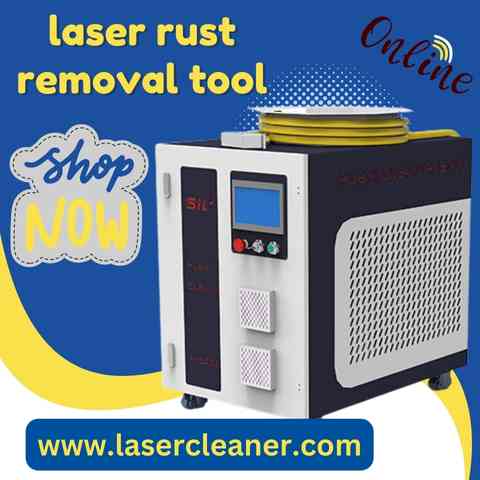Laser Rust Removal Tool: Revolutionizing Metal Cleaning for Industrial and DIY Applications

Rust has long been a persistent problem for metal surfaces, causing corrosion, structural weakening, and aesthetic deterioration. The traditional methods of rust removal, such as chemical treatments, sandblasting, and mechanical abrasion, often carry environmental concerns, safety risks, or the potential for damaging the metal surface. In this context, the laser rust removal tool has emerged as a cutting-edge solution that is transforming how industries and individuals approach rust management.
A laser rust removal tool operates on the principle of high-intensity light energy targeting rust layers on metal surfaces. Unlike conventional methods that rely on abrasive materials or harsh chemicals, lasers focus energy in a controlled manner, evaporating the rust without causing harm to the underlying metal. This precision makes it suitable for delicate surfaces, including automotive parts, industrial machinery, and historical artifacts that require careful preservation.
Industries across the globe are increasingly adopting laser rust removal tools for routine maintenance and large-scale cleaning tasks. In automotive restoration, the tool allows professionals to strip rust from classic car bodies without altering the original paint or metal thickness. Similarly, in the manufacturing sector, laser tools are used to clean metal components, ensuring that production machinery operates efficiently without downtime caused by corrosion-related failures.
The technology behind laser rust removal is continually advancing. Modern systems incorporate adjustable power settings, different laser wavelengths, and scanning options that enhance versatility. These adjustments allow operators to handle varying degrees of rust, from light surface oxidation to deeper corrosion. In industrial settings, laser cleaning robots can perform large-scale operations autonomously, covering expansive metal surfaces quickly and with consistent results.
Environmental considerations are another area where laser rust removal stands out. Unlike chemical rust removers, lasers do not generate hazardous waste or require complex disposal processes. This aspect has made them an appealing choice for industries seeking sustainable practices. Furthermore, the process is typically quieter than mechanical methods, reducing noise pollution and creating a safer workplace.
Training and ease of use are also essential elements. While high-powered laser systems require professional handling, portable versions designed for workshops or DIY use have simplified interfaces. These tools provide real-time feedback, enabling precise control and minimizing the risk of operator error. For individual users, this opens opportunities to perform maintenance tasks on vehicles, tools, or metal structures with professional-grade results.
The adoption of laser rust removal tools is not limited to traditional industries. Heritage conservation and art restoration have found these tools invaluable. Museums and restoration experts use lasers to remove corrosion from metal sculptures, antique instruments, and architectural elements without disturbing the original craftsmanship. This ability to clean without contact or abrasive intervention preserves historical integrity while effectively eliminating rust.
Market trends indicate a growing demand for laser rust removal tools worldwide. Suppliers are offering a variety of models catering to different scales of operation, from handheld devices to large industrial systems. This expansion reflects both technological maturity and the rising awareness of the benefits associated with laser cleaning, including time efficiency, precision, and environmental responsibility.
Another noteworthy aspect is maintenance and longevity. Laser rust removal tools, when properly maintained, offer years of consistent performance. They reduce the need for repeated chemical treatments or abrasive processes, resulting in cost savings over time. Additionally, the accuracy of laser cleaning minimizes the risk of damaging expensive metal components, which is particularly critical in sectors such as aerospace, automotive, and defense.
Customer experiences highlight the effectiveness of laser rust removal tools. Professionals report that these tools handle complex cleaning tasks with ease, such as removing rust from intricate engine parts, metal joints, or machinery with hard-to-reach areas. Users appreciate the reduced preparation time compared to chemical methods and the absence of secondary clean-up required after mechanical abrasion.
Innovation continues to drive improvements in laser rust removal technology. Recent developments include adaptive laser systems capable of detecting rust thickness and automatically adjusting power levels. Integration with automation and robotics enables large-scale, high-speed cleaning, particularly in manufacturing plants and shipyards where manual methods are impractical. This blend of precision, speed, and efficiency positions laser rust removal tools as a forward-looking solution for modern metal maintenance challenges.
For businesses and individual users seeking reliability, efficiency, and environmental consciousness in metal cleaning, laser rust removal tools offer an unparalleled solution. Their combination of precision, adaptability, and non-contact cleaning makes them suitable for a wide range of applications, from industrial maintenance to fine restoration work.
Final Thoughts
Laser rust removal tool are redefining metal cleaning practices across industries and personal applications. By delivering precise, non-invasive, and environmentally responsible rust removal, these tools represent a significant advancement over traditional methods. As technology progresses, accessibility and performance continue to improve, making laser rust removal an essential consideration for anyone looking to maintain, restore, or preserve metal surfaces effectively.
- Art
- Causes
- Crafts
- Dance
- Drinks
- Film
- Fitness
- Food
- Juegos
- Gardening
- Health
- Home
- Literature
- Music
- Networking
- Other
- Party
- Religion
- Shopping
- Sports
- Theater
- Wellness



